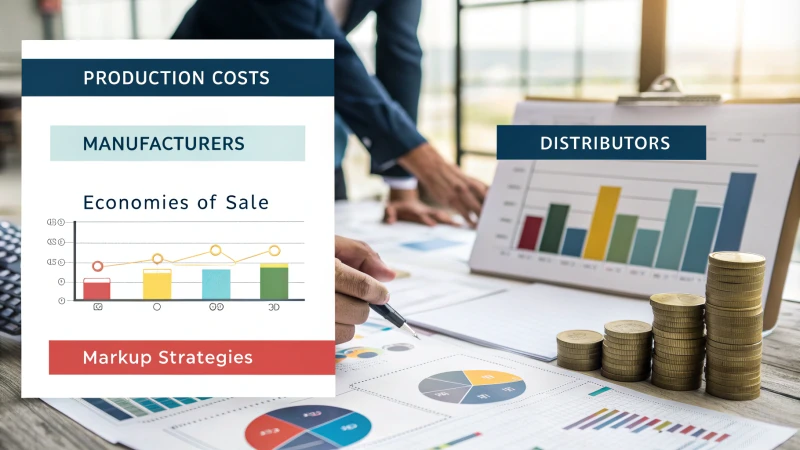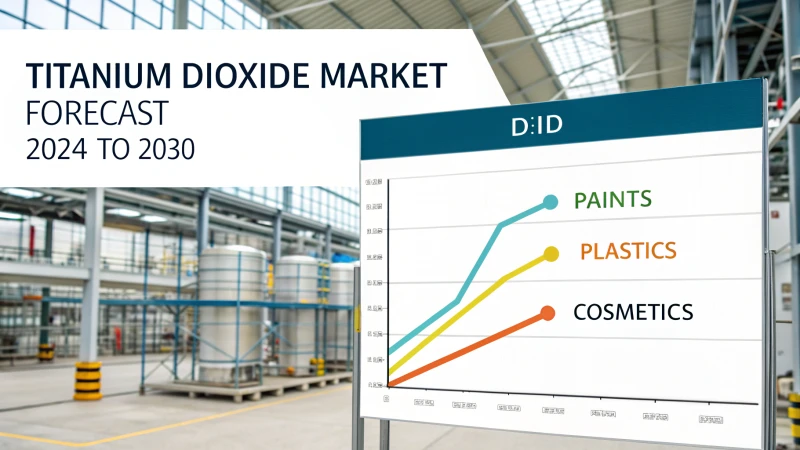
Ever felt unsure about picking a titanium dioxide (TiO2) producer or supplier? Many people face this puzzle. It’s quite a usual problem and I’ve experienced it myself.
Picking a TiO2 supplier or distributor comes with several advantages over buying directly from manufacturers. Customers might get better prices and personalized service. Communication usually becomes simpler. These factors probably lead to significant savings. Cost savings could be really important for your business. The supply chain often becomes more reliable. The supply chain gets better.
In my experience, choosing a TiO2 supplier or distributor transforms the business process. I recall when I first sought TiO2 for my business. I approached a manufacturer directly, thinking this route promised the best price. Instead, I found complex processes and little personal attention. Distributors, however, gave guidance and support that changed everything. Their advice on costs and quality was priceless. They really understood what I needed. It felt like having a partner, not just a transaction.
Let us explore the many benefits suppliers and distributors of TiO2 offer for your business.
[claim claim=”TiO2 suppliers offer better pricing than manufacturers.” istrue=”true” explanation=”Suppliers often have competitive pricing due to bulk purchasing and distribution efficiencies, making them more cost-effective than direct manufacturers.”]
[claim claim=”Working with TiO2 distributors improves communication.” istrue=”true” explanation=”Distributors typically provide enhanced customer service and support, facilitating better communication compared to dealing directly with manufacturers.”]
What Are the Key Advantages of Working with TiO2 Suppliers?
Did you ever think about how working with TiO2 suppliers could change your business? Knowing these benefits really changes your operations and success. These benefits really matter.
Working with TiO2 suppliers gives important benefits such as expert advice that matches your needs. Businesses often find lower prices through their established connections. Customer service feels personal and trustworthy. Communication becomes smooth with promised quality and delivery schedules. These advantages lead to excellent product quality. They also increase efficiency in how you make things.

Expert Guidance
When I first started in the paint industry, I quickly saw that the right suppliers could really help or harm my business. Working with TiO2 suppliers completely changed everything for me. Experienced TiO2 suppliers give very helpful advice. They know a lot, often because they work closely with top manufacturers. Once, I needed help choosing the best TiO2 grade for a new eco-friendly paint line. My supplier listened to my needs and suggested the perfect type, which balanced opacity and durability. Their advice saved me time and really improved my product’s quality.
Explore expert insights1 on selecting TiO2.
Better Pricing
Working with TiO2 suppliers offers cost savings. Their strong ties with manufacturers allow them to negotiate better prices and they share these savings with customers like me. As I ordered more, I was surprised by how much I saved! It’s very reassuring to get high-quality materials without spending too much.
| Supplier Type | Price Range | Advantages |
|---|---|---|
| Direct Manufacturer | $$$$$ | Higher minimum orders |
| Distributors | $$ | Flexible purchasing options |
The distributor’s buying power helps me control costs while keeping quality high.
Learn more about pricing strategies2.
Great Service
TiO2 suppliers focus a lot on customer service. Unlike big manufacturers who mainly care about their biggest clients, my suppliers always treat me like I matter, no matter my order size. They offer help before the sale and follow up after to check if everything is okay. This care builds trust and strong business relationships that I truly appreciate.
This enhanced service includes:
- Pre-sale consultations to understand your needs better.
- In-sale support to ensure smooth transactions.
- After-sale follow-up for quality assurance and satisfaction checks.
Discover how enhanced service can impact your business3.
Good Communication and Promises
Clear communication is crucial in business, especially in supply chains. My TiO2 suppliers are good at facilitating communication between me and manufacturers, so I can easily express my needs and expectations. This leads to faster decisions and fewer misunderstandings. Even better, my suppliers promise product quality and delivery timelines.
- Quality Assurance: Regular checks and certifications.
- Delivery Promises: Timely shipment commitments.
This organized approach reduces risks tied to sourcing materials, allowing smooth production processes, which is essential in our fast-paced industry.
Check out tips for effective communication with suppliers4.
[claim claim=”TiO2 suppliers provide expert guidance for product selection.” istrue=”true” explanation=”Experienced TiO2 suppliers help clients choose the right grades, enhancing product performance and quality.”]
[claim claim=”Working with TiO2 suppliers guarantees lower prices always.” istrue=”false” explanation=”While suppliers often negotiate better pricing, it’s not guaranteed for every situation or order size.”]
How Can Distributors Enhance Your Supply Chain Reliability?
As a person who has worked with supply chains, I know that distributors hold an important place in the process. Distributors keep everything moving and organized. They increase trust and efficiency. Distributors maintain smooth operations. They play a key part.
Distributors increase supply chain reliability by giving expert advice. They probably get better prices because of their strong connections. Customer service really improves with their help. Communication becomes simple and clear. Risk reduction strategies are used by them. Deliveries arrive on time and product quality stays high. Distributors are very important partners in your supply chain.

Understanding What Distributors Do
Distributors give supply chain stability by offering expert advice, better prices, great customer service, clear communication and ways to manage risks. This leads to prompt deliveries and steady product quality.
Expert Guidance and Market Knowledge
Distributors play a big role in the supply chain. They connect manufacturers and customers, handling goods flow and checking that items are top quality and on time. They are like a reliable friend with deep industry knowledge.
One significant advantage of working with distributors is their extensive knowledge of the market. Distributors maintain relationships with various manufacturers, allowing them to provide insights on product specifications, pricing, and availability. This expertise helps businesses make informed decisions when selecting materials.
For instance, when sourcing Titanium Dioxide (TiO2), a distributor can guide clients like Timothy, who owns a paint business in Turkey, on the best grades suitable for their specific applications. This guidance is crucial for maintaining product quality and ensuring compliance with industry standards.
Better Pricing through Established Relationships
Distributors get good prices from manufacturers thanks to strong ties. Distributors manage to get prices that buyers on their own might find tough to obtain.
Volume matters. They use their buying power to secure favorable deals for clients like Timothy.
| Distributor Benefits | Direct Manufacturer Purchasing |
|---|---|
| Better Pricing | Higher Prices |
| Volume Discounts | Limited Negotiation Power |
| Flexible Terms | Rigid Contractual Obligations |
This cost advantage can be passed down to clients, leading to overall savings. Learn more about cost advantages5.
Great Customer Service
Distributors offer really good customer service. Unlike manufacturers who focus on big clients, distributors help small businesses like Timothy’s by providing:
- Pre-sale support: Explaining product choices.
- Order handling: Managing orders and logistics well.
- Post-sale support: Fixing any returns or problems quickly.
This personal touch ensures clients not only get products but also ongoing support. Relationships based on trust often arise from this approach. Explore customer service strategies6.
Improved Communication and Easy Processes
Distributors excel in communication. They act as a contact point, easing talks between manufacturers and clients. I remember when Timothy needed a TiO2 order change; through distributor contacts, adjustments happened swiftly, maintaining his production timeline.
Moreover, many distributors use advanced systems for shipment and inventory tracking, giving real-time updates to customers. Transparency is really key! Check out technology in supply chain management7.
Strategies to Handle Risks
In uncertain markets, managing risks becomes crucial. Distributors manage risks by diversifying suppliers and building strong ties with many manufacturers. They use methods like:
- Plan B Preparations: Switching quickly to other suppliers if issues occur.
- Stock Management: Advising on ideal stock levels based on demand trends.
This proactive method keeps clients like Timothy on schedule with minimal disruptions. Preparedness is everything! Learn more about risk management in supply chains8.
[claim claim=”Distributors improve supply chain reliability through expertise.” istrue=”true” explanation=”Distributors leverage their market knowledge and relationships to enhance the reliability of supply chains, ensuring timely deliveries and quality products for clients.”]
[claim claim=”Direct purchasing always guarantees better pricing than distributors.” istrue=”false” explanation=”Direct purchasing often lacks the negotiation power that distributors possess due to their bulk buying capabilities and established relationships with manufacturers.”]
What Should You Consider When Evaluating TiO2 Suppliers?
Choosing the right titanium dioxide (TiO2) supplier might seem difficult, but it shouldn’t be! Let’s look at important factors together that help you select the best option for your company.
Evaluate TiO2 suppliers by looking at several important points. Check product quality by examining purity and particle size. Supplier reputation matters; look at their certifications and customer reviews. Pricing structures include bulk discounts and long-term contracts. Remember them. Technical support is essential, too. Logistics involve delivery timelines, which are very crucial. Regulatory compliance is necessary. These aspects help with informed purchasing decisions.

Understanding Product Quality
When I began sourcing titanium dioxide, I felt nervous about selecting the right supplier. There were many factors to consider! Over time, I discovered that focusing on key elements helps simplify the process. Let’s explore them together.
When evaluating TiO2 suppliers, product quality is paramount. Titanium dioxide comes in various grades and types, which can significantly influence the final product’s performance. Consider the following factors:
- Purity: High purity is essential – impurities spoil color, opacity and durability. Receiving a low-purity batch taught me a tough lesson.
- Particle Size: Different projects may require finer particles for better coverage; knowing this has saved me from many challenges!
For example, high-purity TiO29 consistently made my paints brighter, pushing my products ahead in a crowded market. Brighter paints really catch the eye.
Supplier Reputation and Reliability
A supplier’s reputation usually shows their dependability. I search for:
- Industry Certifications: ISO certifications indicate adherence to high standards.
- Customer Reviews: Insights from other customers’ experiences are invaluable. Reliable suppliers get positive feedback.
Here’s a quick table summarizing my focus when assessing supplier reliability:
| Factor | Importance Level | Notes |
|---|---|---|
| Certifications | High | Look for ISO or similar |
| Customer Feedback | Medium | Check platforms like Google |
| Experience in Industry | High | Established suppliers are often more reliable |
Pricing Structures
Pricing often feels challenging. As a cost-sensitive manufacturer, I search for:
- Bulk Discounts: Savings can be significant.
- Long-Term Contracts: Relationships often lead to better rates.
Researching bulk pricing options10 from various suppliers enabled me to get competitive rates. Competitive pricing benefits me greatly.
Technical Support and Guidance
Supplier technical support greatly affects daily operations:
- Expertise in Applications: Do they guide me in selecting the right TiO2 grade? Such support proves invaluable for my needs.
- Pre-Sales and After-Sales Service: What help do they offer after purchase?
Having strong technical resources keeps my production smooth. Access to technical resources available11 matters a lot.
Logistics and Delivery Timelines
Timely delivery is always crucial. To remain on schedule, I evaluate:
- Lead Times: Speed of delivery after order placement matters.
- Shipping Options: Different methods impact costs.
Creating a chart comparing lead times helps in making informed choices. Quick delivery supports efficiency.
Regulatory Compliance
Finally, my TiO2 supplier must meet all necessary regulations:
- Safety Data Sheets (SDS): Easy access ensures safe material handling.
- Environmental Regulations: Following laws matters for sustainability and peace of mind.
Reviewing regulatory compliance12 documents has shielded my operations from legal issues. Compliance is non-negotiable.
In conclusion, choosing the right TiO2 supplier involves carefully considering various factors. With a strong focus on quality, reputation, support, pricing, logistics and compliance, I found the task manageable. Let’s continue discussing as we navigate these decisions together.
[claim claim=”High purity TiO2 improves paint durability and brightness.” istrue=”true” explanation=”High-purity titanium dioxide enhances the performance of paints by increasing their brightness and durability, making it a crucial factor in supplier evaluation.”]
[claim claim=”ISO certifications guarantee TiO2 supplier reliability.” istrue=”true” explanation=”ISO certifications indicate that a TiO2 supplier adheres to recognized quality standards, enhancing their reliability in the market.”]
What Makes Pricing Structures Unique for Manufacturers and Distributors?
Do you ever think about why product prices differ when buying from a manufacturer or a distributor? Let’s explore the complex world of supply chain pricing.
Manufacturers decide prices by considering their production costs and the large quantity they can produce cheaply. Distributors usually add extra costs to these wholesale prices. This extra cost covers their services and competition in the market. It shows a different way of pricing that serves end-users and small businesses. Prices take into account both services and market competition.

Understanding Manufacturer Pricing
I have spent many years moving through the complex world of manufacturing and distribution. I have seen how pricing can vary greatly between these two groups. It’s more than just numbers. It’s also about relationships. Service plays a big role. Understanding the market is very important. Let’s explore the details together!
Manufacturers primarily set prices based on production costs, including raw materials, labor, and overhead. They aim for profitability while also considering market demand and competition. The pricing strategy is often straightforward; however, larger manufacturers may have the flexibility to offer volume discounts due to economies of scale.
For instance, a manufacturer producing titanium dioxide (TiO2) might have a base price that reflects their production costs. As they achieve higher volumes, they can reduce prices slightly, which benefits both them and their clients. This pricing model is essential for maintaining long-term relationships with large customers, such as paint manufacturers.
Distributor Pricing Dynamics
In contrast, distributors typically operate with a different pricing structure. They purchase from manufacturers at wholesale prices and add their markup before selling to end-users or smaller businesses. This markup can vary widely based on factors like service offerings, inventory costs, and the level of competition in the distributor’s region.
| Pricing Factors | Manufacturers | Distributors |
|---|---|---|
| Cost Basis | Production costs | Wholesale price + Markup |
| Discounts | Volume-based | Negotiated based on relationships |
| Target Customers | Large scale buyers | Smaller businesses, end-users |
| Service Level | Limited customer service | Enhanced support and guidance |
Factors Influencing Pricing Differences
Several factors contribute to the disparities between manufacturer and distributor pricing:
- Volume Purchases: Distributors often buy in bulk, allowing them to negotiate better rates with manufacturers.
- Market Positioning: Distributors may adjust prices to remain competitive in their specific markets, influencing how they position themselves against direct manufacturer sales.
- Service Offerings: Distributors often provide additional services such as logistics support, which can justify higher prices compared to manufacturers who focus solely on production.
Conclusion
In summary, while manufacturers focus on production cost and volume, distributors tailor their pricing strategies to market demands and service levels. Understanding these differences can help businesses navigate their procurement processes more effectively and potentially leverage better pricing agreements. For more insights on pricing strategies in the supply chain, check out how distributors leverage pricing13.
[claim claim=”Manufacturers set prices based on production costs.” istrue=”true” explanation=”Manufacturers primarily determine their pricing by considering the costs of production, including materials and labor, to ensure profitability.”]
[claim claim=”Distributors always offer lower prices than manufacturers.” istrue=”false” explanation=”Distributors add a markup to wholesale prices, which can result in higher prices compared to manufacturers, depending on services offered.”]
Conclusion
Opting for a TiO2 supplier or distributor provides cost savings, enhanced customer service, and reliable communication, significantly benefiting businesses in their procurement processes.
-
Discover valuable insights on how working with TiO2 suppliers can enhance your operations and reduce costs. ↩
-
Learn about pricing strategies when sourcing TiO2 from reliable suppliers. ↩
-
Find out how enhanced customer service from TiO2 suppliers can improve your procurement process. ↩
-
Understand the importance of effective communication in your supply chain when working with TiO2 suppliers. ↩
-
Discover how distributors can improve your supply chain reliability through effective strategies and partnerships. ↩
-
Explore customer service strategies from distributors that enhance your supply chain operations. ↩
-
Learn about technology solutions distributors use for better supply chain management. ↩
-
Understand risk management strategies employed by distributors to ensure supply chain stability. ↩
-
Understanding these factors will help you make informed decisions when selecting a TiO2 supplier. ↩
-
Find out how customer feedback can impact supplier choice and procurement strategies. ↩
-
Learn more about the importance of technical support when selecting a supplier for titanium dioxide. ↩
-
Explore regulations that TiO2 suppliers must comply with for safety and environmental standards. ↩
-
Explore this link for comprehensive insights on pricing strategies that can help optimize your procurement process. ↩





